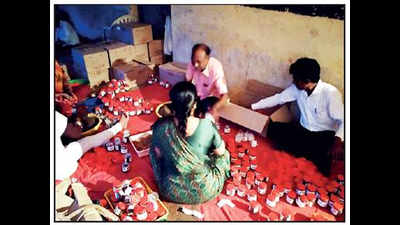Trending
This story is from October 2, 2019
Night soil manure from Akola to Sabarmati ashram

The Akola ZP has sent around 10,240 jars of manure to Ahmedabad for the guests attending Gandhi Jayanti at Sabarmati ashram
PUNE: The Election Commission of India (EC) has given special permission to the Akola zilla parishad in poll-bound Maharashtra for sending night soil manure, popularly known as “sona khad”, as token gift for the guests attending the 150th birth anniversary celebrations of Mahatma Ganghi at Sabarmati ashram.
Government officials here said the permissions had to be taken from the EC to send the manure to Ahmedamad, as the model code of conduct was in place in Maharashtra because of the October 21 assembly elections.
Around 10,240 jars containing the night soil manure, which is treated human fecal matter, have been sent to Ahmedabad to mark the event that will promote Swachata Abhiyan. Sprinkled with seeds that will germinate upon watering, the manure is high on nitrogen, phosphorus and potassium.
“Our officials and women self-help groups have packed 89 cartons, each containing 100g of the manure, to mark the special event,” Akola ZP chief executive officer Ayush Prasad said.
Sending the manure to Ahmedabad was not an easy task for the ZP officials because the recent downpour in Maharashtra reduced the night soil stock. “All districts were asked to identify the manure and send it to Akola. We found the ‘sona khaad’ from an octogenarian’s house in Akola, who had built a twin pit toilet in 2014. For a week, the zilla parishad deployed a special squad with necessary equipment to excavate such toilet pits across the state following finding of the manure,” an official said.
The excavated material had high moisture content because the pits were just below the earth’s surface. “The material had to be taken in a dilapidated room for drying under the guidance of Unicef consultants,” he said.
“The night soil in jars will be the perfect beginning for the Swaccha Bharat Mission 2:0 on Swachata Diwas in Sabaramti on October 2,” Unicef consultant Yusuf Kabir said.
Government officials here said the permissions had to be taken from the EC to send the manure to Ahmedamad, as the model code of conduct was in place in Maharashtra because of the October 21 assembly elections.
Around 10,240 jars containing the night soil manure, which is treated human fecal matter, have been sent to Ahmedabad to mark the event that will promote Swachata Abhiyan. Sprinkled with seeds that will germinate upon watering, the manure is high on nitrogen, phosphorus and potassium.
“Our officials and women self-help groups have packed 89 cartons, each containing 100g of the manure, to mark the special event,” Akola ZP chief executive officer Ayush Prasad said.
The manure has been tested successfully for onion cultivation at Rajgurunagar and Khed in Pune. The concept was experimented in the twin pit toilets built in rural Pune in 2014-15. The manure proved to be effective fertilizer-free compost after treatment and ensured improved at a cost much lower than the usual fertilizers.
Sending the manure to Ahmedabad was not an easy task for the ZP officials because the recent downpour in Maharashtra reduced the night soil stock. “All districts were asked to identify the manure and send it to Akola. We found the ‘sona khaad’ from an octogenarian’s house in Akola, who had built a twin pit toilet in 2014. For a week, the zilla parishad deployed a special squad with necessary equipment to excavate such toilet pits across the state following finding of the manure,” an official said.
The excavated material had high moisture content because the pits were just below the earth’s surface. “The material had to be taken in a dilapidated room for drying under the guidance of Unicef consultants,” he said.
“The night soil in jars will be the perfect beginning for the Swaccha Bharat Mission 2:0 on Swachata Diwas in Sabaramti on October 2,” Unicef consultant Yusuf Kabir said.
End of Article
FOLLOW US ON SOCIAL MEDIA










